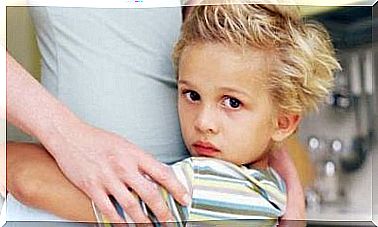What Should I Do If My Child Is Underweight?

My child is underweight – what should I do to help him or her? This is a question that can create great anxiety for young children with some kind of nutritional problem. Today we will tell you everything you need to know if your child is underweight.
Society tends to look down on being overweight, especially when it happens in children. In the same way, people can look down and expel a child who is underweight.
An underweight child can be a red flag for parents when the cause of the condition is unknown. Adults often make the serious mistake of letting these children eat all the junk food they want.
They think this will help them gain weight in a healthy way. Of course, it’s anything but just healthy.
In fact, the best way to help a child gain weight is to change his or her nutritional habits. A good change begins with identifying and choosing the right foods.
To gain weight, children need foods that are high in nutrients, vitamins and acceptable calories.
The first step I need to take if my child is underweight
In any case, the first thing you need to do is talk to your child’s doctor. He or she will decide what is best for your little one. Routine examinations and a good medical opinion are always the best solution.
What are the possible causes of my child’s underweight?
Inheritance
Your child’s build can simply be the result of the genes he or she inherited from your family or your partner’s family.
If the mother or father is slim, the baby will most likely also be slim. If not, a doctor should evaluate your child and find the cause.
Little interest in eating leads to more children being underweight
Kids love to eat. Of course, they do not love everything, but there is a large selection of food they can eat and enjoy. Therefore, if your child is not interested in eating, then it may be an indication of a medical or psychological problem.
Another cause may be hormonal imbalance or metabolism, such as diabetes or hyperthyroidism. Your child may also be allergic to certain foods or suffer from gastrointestinal problems. Any condition can make eating uncomfortable for your child.

Bullying leads to more children becoming underweight
During prepuberty, the appearance of eating disorders among children is a common consequence of social pressure or exclusion. In this way, bullying can lead to bulimia and anorexia.
Physical activity
An excess of physical activity causes the metabolism to accelerate. In extreme cases, it does not allow the individual to digest and assimilate food properly.
How can I help my child reach his or her ideal weight?
Being within a healthy weight range is a fundamental part of long-term health. Exercise and proper nutrition are a big part of what keeps us healthy. In addition, you can take the following factors into consideration:
Frequent meals
If your child is underweight, frequent meals are a good strategy. It’s not just the question of what your child eats, but also how often. Young children have a smaller stomach, so they need to eat up to six or seven times a day.
Healthy family habits
It is important for the rest of the family to set a good example. If the whole family has healthy eating habits, the child will easily be able to follow this lifestyle. Logically, it contributes to your child’s overall health.
Combining an effective exercise routine with a healthy diet is a wise decision. Physical exercise stimulates the appetite. Therefore, it can be very helpful to get your child active before meals.
In addition to all this, you should avoid unhealthy foods like cakes, soft drinks, biscuits, fast food, junk food and sweets.
Eating these things makes a person’s chances of developing health problems much greater. Some of the risks include diabetes, heart disease due to excess fat, etc.
What should I do to help my child gain weight?

The first thing you need to do is evaluate your family’s eating habits and make necessary changes to be healthier.
Avoid sugary juices and soft drinks and cut back on high-calorie foods. None of these things will help your child gain weight in a healthy way.
To replace these products, replace them with some better alternative foods that contain a balanced amount of calories and nutrients.
Look for choices that are packed with vitamins and minerals. Having a variety of these things available will help you create endless menus that your child will enjoy.
Strive to provide a diet that includes items from the major food groups. Include carbohydrates such as pastas, breads and cereals. Serve fruits and vegetables throughout the day.
Give your family proteins like beef, fish, grains and eggs and dairy products like milk, yogurt and cheese. At the same time, avoid excess fiber. Whole grain rice and pastas will reduce your baby’s appetite.
Remember that fats are not always bad for our body. For example, vegetable-based oils are a great way to add nutrients to a diet. Seeds and nuts are the great choices for afternoon snacks, or to add flavor and crunch to your meals.
If your child is not a big fan of eating fruit, then you can try smoothies, natural ice cream sticks and fruit salads.
As for vegetables, you can cook delicious purees and pot pies. With creativity and innovation, you will definitely strike a spark in your son’s or daughter’s appetite.
The reasoning behind all these changes is to provide the right vitamins and nutrients. With the exception of a medical diagnosis that requires specific treatment, it will be sufficient to eat healthy if you want to help your child gain weight in a proper way.
Sometimes change is difficult but necessary, especially when it comes to the health of our family.









